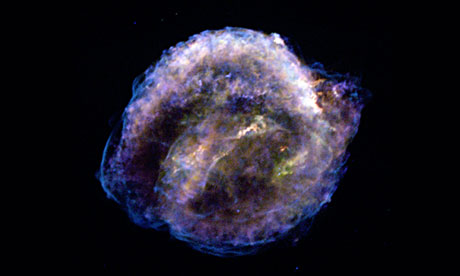Is the 'Wang particle' the new Higgs boson?
The hunt might soon be on for another fundamental building block of nature. But what will it be called?
The hand of fate is shaky when it comes to naming the building
blocks of nature. Some physicists are immortalised by their discoveries,
others not. There is, alas, no Professor Quark. But the Higgs boson is so sexy they named it twice – after Peter Higgs and Satyendra Nath Bose, though not, as it happens, after God.
Now we hear reports of the Wang particle – a particle that may explain supernovas, the most energetic explosions in the universe.
Massive stars collapse under their own gravity once their nuclear fuel is spent. The implosion compresses the star's iron core into neutrons. Charles Wang at Aberdeen University, and others, said the core might ring like a bell and emit ripples in spacetime that spread out like sound waves and power supernova explosions. These new waves come with an associated particle. In November, scientists will look for evidence of the entity at Cern's Isolde experiment. The biggest thing since the Higgs? Who knows.
So is the hunt for the Wang now on? Robert Bingham at Rutherford Appleton Laboratory in Oxfordshire works on the theory with Wang. "I've never thought of calling it that. He hasn't either. We'd tend to call it the scalar gravitational particle."
Now we hear reports of the Wang particle – a particle that may explain supernovas, the most energetic explosions in the universe.
Massive stars collapse under their own gravity once their nuclear fuel is spent. The implosion compresses the star's iron core into neutrons. Charles Wang at Aberdeen University, and others, said the core might ring like a bell and emit ripples in spacetime that spread out like sound waves and power supernova explosions. These new waves come with an associated particle. In November, scientists will look for evidence of the entity at Cern's Isolde experiment. The biggest thing since the Higgs? Who knows.
So is the hunt for the Wang now on? Robert Bingham at Rutherford Appleton Laboratory in Oxfordshire works on the theory with Wang. "I've never thought of calling it that. He hasn't either. We'd tend to call it the scalar gravitational particle."

0 comments:
Post a Comment